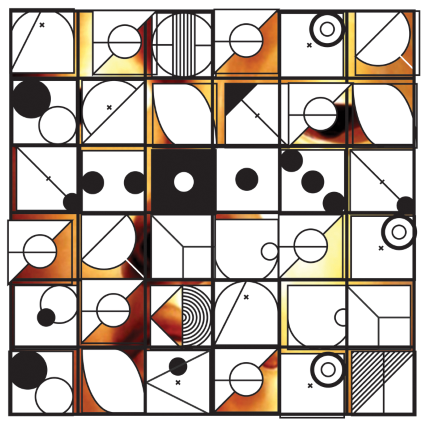Somewhere, in either Arone Dyer’s or Aron Sanchez’s house—maybe displayed prominently in some music room or possibly hid deliberately away in some corner shrine—I would imagine that there is a collection of worn LP’s by bands like Wire, Siouxie and the Banshees, and The Pixies which keep close company. And after listening to General Dome, the duo’s latest record as Buke and Gase, I can imagine that these records are obsessed over quite frequently. Known for their homemade instruments, such as the “toe-bourine”, the “buke” (a six-string former baritone ukulele), and the “gase” (an electric guitar-bass fusion), the Brooklyn duo have combined their love of angular post-punk with a quirky indie rock aesthetic that deftly combines memorable melodies and hooks a-plenty into an oddly familiar but still thoroughly enjoyable jumble.
Like a well-oiled machine—gears interlocking and axles spinning—General Dome opens with revved-up rocker “Houdini Crush,” and from there, the record never really slows down. If you’re looking for an album that defers to the listener then you’re out of luck. You either keep up or get left behind. But far from being indifferent to their audience, Dyer and Sanchez merely seem to be channeling the spirit of their post-rock forebears. It’s fairly obvious from tracks like “General Dome” and “In The Company Of Fish” that the band is using tossed off chunks of squealing electric guitar and chest-rattling percussion in the same way The Pixies or X did—namely in the pursuit of a hybrid melodic punk aesthetic. And like punk pioneers Poly Styrene and Siouxsie Sioux, Dyer can flex her vocals to the limit when she has a mind to, and her barn-burning howls rattle th e walls of the tracks on General Dome.
But neither Dyer not Sanchez come across as anything like the nihilist, snot-nosed punks that The Pixies or Wire drew inspiration from—and yeah, I’m talking about bands like The Sex Pistols and The Stooges (sorry for the association Mr. Pop). It seems like some reverse truism, this idea of an adult punk, but as a group, Buke and Gase seem to embody this rather curious ideology quite well. They’ll spit in your face and kick dirt in your face when you’re down but they’d eventually help you up and buy you a beer afterward. General Dome also borrows fairly heavy from early 90’s indie rock—imagine early Matador or Merge Records artists like Honor Role or Unsane. That thick, angular guitar chug that featured so prominently on records from those artists, and dozens of others at the time, laid the foundation for the indie rock guitar sound of the past 20 years and one in which Buke and Gase deal in extensively, with tracks like “Twisting The Lasso Of Truth” and “Split Like A Lip, Blood On The Beard” proving that, no matter how much they’re used, guitars can still make the ground shake when they want to.
But never settling for simple trad-rock/post-punk execution, the group brings in aspects of current musical trends like the pitch manipulation on Dyer’s vocals on “Cyclopean” and the chorale inflections and lo-fi studio affectations on the two shorter interstitial tracks “Sturtle” and “You Do Yours First” respectively. But as much as they do incorporate some bits and pieces from expected current indie convention, this record still feels most indebted to the early 90’s indie rock scene. It’s in this meticulous regard for that scene that the record shows its greatest strengths and unavoidable weaknesses. As much as Dyer and Sanchez sound honest and unaffected, the record, for better or worse (almost always for the better), never sounds like anything more than a product of its seemingly inexhaustible influences. Though it is difficult to overly criticize a record that gets so much right when it comes to the unenviable task of weeding through their own extensive influences and trying to come up with something not entirely beholden to their musical heroes. However, it seems that with General Dome, Buke and Gase have managed to do just fine, and they’ve created a record that looks forward, as well as backward, to what indie rock has been and what it has the potential to be.

